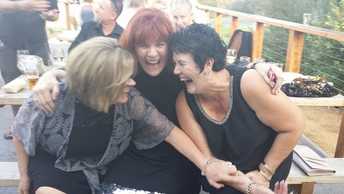My adult professional working life (one aspect of a colourful tapestry that is the "DC story") is summed up as having been a career in the health sector. Yes, it has been diverse and some say eclectic, but, always interesting, rewarding and fulfilling with many opportunities having come my way. However, at the moment, it is reflection on people that has absorbed my thinking.
After all, my work life is about delivering care to people, delivered by people and enabled and supported by other people.
In some ways this thinking has been stimulated by a conversation with Terry recently, after he had asked me “why do you still feel driven to do more?”
Having worked through clinical, education, management and now executive roles, it may seem that the journey is relatively fulfilled. But I don’t think or feel it is. It really has stirred up my thoughts, which I am not sure I am able to fully articulate yet. However a post on a blog of a friend, colleague and all inspiring woman I know in Canada; Barb Shellian, has really struck a chord.
She talked about courageous leadership and quoted a list of characteristics from Susan Tardanico (I confess, I did not know who this person was, but have since “googled”).
I liked the list and I started to think about this in context of what I still want to pursue.
Courageous leaders ………. (from Susan Tradanico via my friend Barb)
1. Confront reality head-on. Ditch the rose-colored glasses and face the facts. Only by knowing the true current state can you lead to a better place.
2. Seek feedback and listen. We all have blind spots that impact the way we interact with others. Unfiltered 360-degree feedback is not always easy to hear, but it can breathe new life into your relationships and leadership style if you listen and act.
3. Say what needs to be said. Real conversations can be awkward and uncomfortable, especially if conflict is involved. Having crucial conversations helps cut through the smoke and move through issues. This also means having the courage to put your opinions on the table, even if they are unpopular.
4. Encourage push-back. Many leaders feel pressure to have all the answers. By encouraging constructive dissent and healthy debate, you reinforce the strength of the team and demonstrate that in the tension of diverse opinions lies a better answer.
5. Take action on performance issues. Confronting people issues is hard, which is why so many leaders ignore them until they become a toxic threat to the team performance. By taking swift action , you are helping yourself, the team and the profession.
6. Communicate openly and frequently. Keep the lines of communication open, even when you don’t know all the answers. Courageous leaders refuse to hide behind jargon and wiggle-words – they use straight-talk and are not afraid to say “I don’t know.” They also share information instead of hoarding it.
7. Lead change. In fear-based environments, it’s all about protecting the status quo. Envision a better way, a better solution, a better product – and approach it with determination and an open mind, knowing that it will be messy and that a mid-course correction may be necessary. Remember that you need to bring people along the change process for them to truly engage.
8. Make decisions and move forward. Especially in environments of fear and intense change, it feels unsafe to commit to a decision and move ahead. Avoid the crutch of ‘analysis paralysis’ and make the decision. Forward movement is always better than being stuck in place.
9. Give credit to others. Let go of the need for praise and instead give the credit to those around you. Remember that a good leader takes more than their fair share of the blame and less than their fair share of the credit.
10. Hold people (and yourself) accountable. Expect people to perform and deliver on their commitments, and have courage to call them out when they don’t follow through. Remember that accountability begins with you – holding yourself responsible for modeling the behaviors you expect of others.
I think I am starting to get it....
I want to be able to settle in my head and heart that I have achieved a worthwhile contribution. My contribution needs to be in harmony with the values that I feel are important and be making a difference in caring for people well.
DC
















 RSS Feed
RSS Feed
